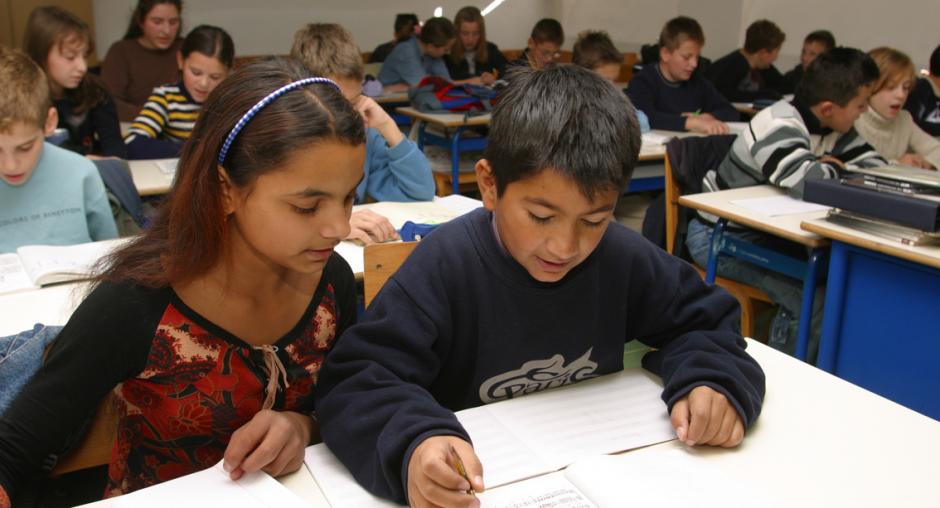Newsroom
OSCE Mission produced documentary on Roma community to premiere in Sarajevo
SARAJEVO 8 April 2004

(OSCE/Dejan Vekic)Romani children are gaining greater access to schools as a result of education reforms supported by the OSCE Mission to Bosnia and Herzegovina, 5 November 2003. (OSCE/Dejan Vekic) Photo details
SARAJEVO, 8 April 2004 - A documentary about the Roma community, produced and filmed by the OSCE Mission to Bosnia and Herzegovina, will premiere here today, marking International Roma Day.
The film, "Absent: Roma in School," sheds light on the struggle of the Roma community in Bosnia and Herzegovina for education. It follows the story of three Romani children. One of the boys featured in the documentary must sadly choose work over studies in order to support his family, yet another one's dedication to learn triumphes over his family's financial and social barriers. The third hero of the film was prevented by her family members from going to school and could only attend classes after her father deserted the family.
"This documentary provides a very comprehensive overview of the situation for Roma children in Bosnia and Herzegovina," said Ambassador Robert Beecroft, the Head of the Mission. "It highlights the important role of education for the Roma community, despite the numerous social and economic challenges that often prevent their children from attending class."
"Education is a priority for the Roma community. Along with BiH officials and educators, they have worked to ensure that Romani children attend public school," he added.
The documentary will premiere today throughout Bosnia and Herzegovina on FTV at 14:15, ATV at 16:00 and RTRS at 20:00.
Basic education is not automatic for Roma children. But, in Bosnia and Herzegovina, the Roma community has taken action to enable their children to enroll in classrooms. Through their involvement, local authorities adopted the National Action Plan on the Educational Needs of Roma and Other National Minorities last February, which acknowledges the disadvantaged position of Roma in Bosnia and Herzegovina and the need to ensure that equal opportunity for education is guaranteed for their community.
Ambassador Beecroft also pointed out that the achievements of the Roma in Bosnia and Herzegovina could be a model for other minority communities throughout South Eastern Europe. "It proves that civic participation and solidarity can achieve results, even by an underrepresented group," he said.
The film, "Absent: Roma in School," sheds light on the struggle of the Roma community in Bosnia and Herzegovina for education. It follows the story of three Romani children. One of the boys featured in the documentary must sadly choose work over studies in order to support his family, yet another one's dedication to learn triumphes over his family's financial and social barriers. The third hero of the film was prevented by her family members from going to school and could only attend classes after her father deserted the family.
"This documentary provides a very comprehensive overview of the situation for Roma children in Bosnia and Herzegovina," said Ambassador Robert Beecroft, the Head of the Mission. "It highlights the important role of education for the Roma community, despite the numerous social and economic challenges that often prevent their children from attending class."
"Education is a priority for the Roma community. Along with BiH officials and educators, they have worked to ensure that Romani children attend public school," he added.
The documentary will premiere today throughout Bosnia and Herzegovina on FTV at 14:15, ATV at 16:00 and RTRS at 20:00.
Basic education is not automatic for Roma children. But, in Bosnia and Herzegovina, the Roma community has taken action to enable their children to enroll in classrooms. Through their involvement, local authorities adopted the National Action Plan on the Educational Needs of Roma and Other National Minorities last February, which acknowledges the disadvantaged position of Roma in Bosnia and Herzegovina and the need to ensure that equal opportunity for education is guaranteed for their community.
Ambassador Beecroft also pointed out that the achievements of the Roma in Bosnia and Herzegovina could be a model for other minority communities throughout South Eastern Europe. "It proves that civic participation and solidarity can achieve results, even by an underrepresented group," he said.
